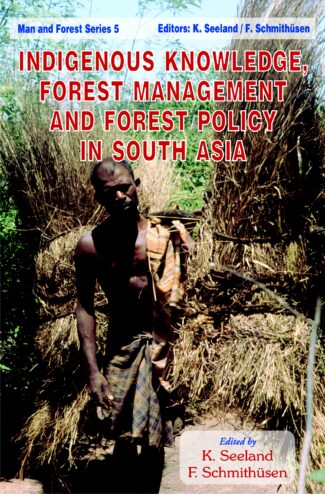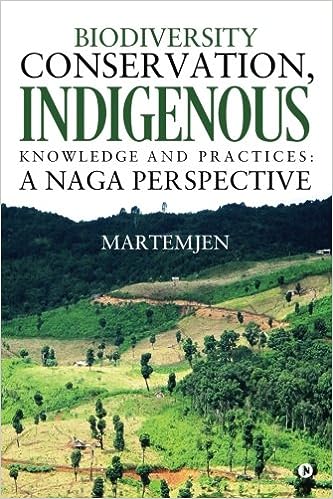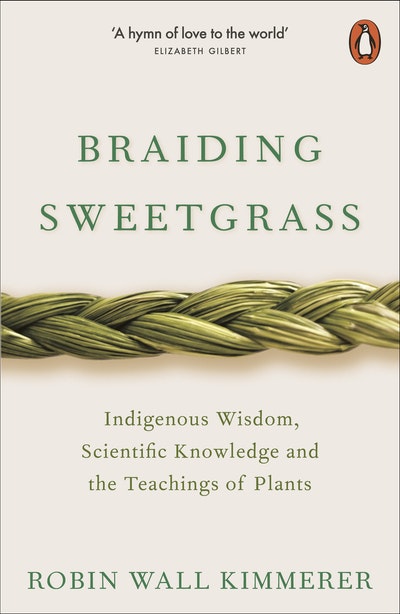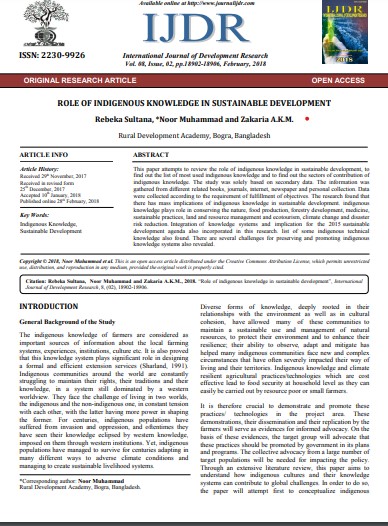Knowledge Hub

Indigenous Knowledge, Forest Management, and Forest Policy in South Asia Indigenous Knowledge, Forest Management, and Forest Policy in South Asia
2003
Author(s): Seeland K, Schmitusen F
The volume includes widely varied case studies on the role of indigenous knowledge in forestry, community living, and joint management of local natural resources. This book consists of 17 papers, based on cross-cultural, interdisciplinary investigations of well-known scholars of forest management, ethno-botanists, social anthropologists and of the members of several local NGOs involved in either community forestry or village development programmes.

Biodiversity Conservation, Indigenous Knowledge and Practices: A Naga Perspective
2017
Author(s): Martemjen
The author draws attention on the Naga indigenous knowledge system in the light of United Nations Convention on Biological Diversity (UNCBD), through which they were able to sustainable manage and conserve their biodiversity while obtaining their livelihood from the same.
Poultry Farm Manual: A Reference Guide for Central & State Poultry Farms 2014-15
2015
Author(s): Government of India, Ministry of Agriculture and Farmers Welfare,
The publication of this Poultry Farm Manual, would act as a reference book for all poultry farms in public sector including Central Poultry Development Organizations (CPDOs). The manual is broadly divided in three parts: history & planning, technical and administrative. The technical portion is applicable to most of other public sector farms besides CPDOs.
FAO Policy on Indigenous and Tribal Peoples
2015
Publisher/Organisation: Food and Agriculture Organization of the United Nations
The central purpose of the policy is to provide a framework to guide FAO’s work where indigenous peoples are concerned. It gives information about indigenous peoples’ livelihoods, world views and concerns about development, including certain “core principles” which should be at the heart of joint activities.
Environment, Religion and Culture in the Context of the 2030 Agenda for Sustainable Development
2016
Author(s): United Nations Environment Programme
The publication gives a brief outline of the integrated approach and the inter-linkages of the different religions; of religion, culture and the environment; and of the environment and socioeconomic dimensions of sustainable development.

Braiding Sweetgrass: Indigenous Wisdom, Scientific Knowledge and the Teachings of Plants
2020
Author(s): Kimmerer, RW
The book shows how other living beings - asters and goldenrod, strawberries and squash, salamanders, algae, and sweetgrass - offer us gifts and lessons, even if we've forgotten how to hear their voices.
Engagement with Indigenous People Preserves Local Knowledge and Biodiversity Alike
2022
Author(s): Gardner EM, Puad ASA, Pereira JT, Tagi J, Nyegang S, Miun P, Jumian J, Pokorny L, Zerega NJC
This study illustrates how meaningful engagement with indigenous knowledge throughout the scientific process can improve biodiversity science and promote conservation, particularly in studies of crop wild relatives, an international priority for food security in the face of climate change.
Where Does Local and Indigenous Knowledge in Disaster Risk Reduction Go from Here? A Systematic Literature Review
2022
Author(s): Hadlos A, Opdyke A, Hadigheh SA
The study conducted a systematic literature review, identifying 325 articles that were qualitatively coded to identify what practices constitute Local Indigenous Knowledge (LIK), patterns in how it has been studied, and how current understanding of LIK fits to the Sendai Framework.
Role of Indigenous and Local Knowledge in Seasonal Forecasts and Climate Adaptation: A Case Study of Smallholder Farmers in Chiredzi, Zimbabwe
2023
Author(s): Zvobgo L, Johnston P, Olagbegi OM, Simpson NP, Trisos CH
The article demonstrates the widespread reliance of farmers on IK and LK for seasonal forecasts, and the strong positive link between the use of IK and LK and the implementation of climate adaptation actions in Chiredzi, Zimbabwe.

Role of Indigenous Knowledge In Sustainable Development
2018
Author(s): Sultana R, Muhammad N and A.K.M. Z.
This study attempts to review the role of indigenous knowledge in sustainable development, to find out the list of most used indigenous knowledge and to find out the sectors of contribution of indigenous knowledge.



